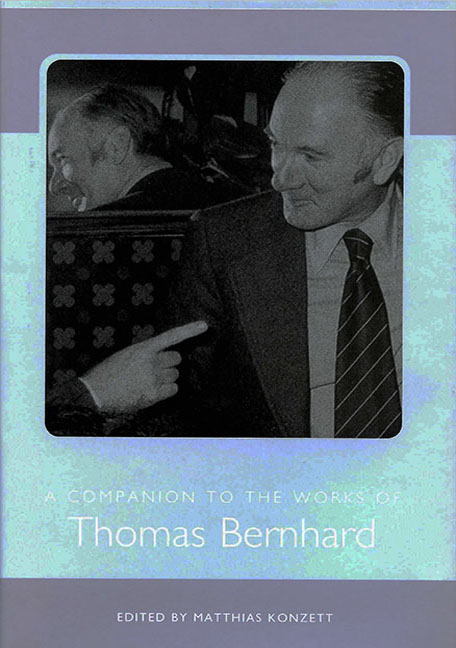Book contents
- Frontmatter
- Contents
- Acknowledgments
- Abbreviations
- Bernhard in the Public
- Bernhard's Poetics
- Homeland, Death, and Otherness in Thomas Bernhard's Early Lyrical Works
- The Broken Window Handle: Thomas Bernhard's Notion of Weltbezug
- Thomas Bernhard's Poetics of Comedy
- Bernhard and Drama
- Bernhard's Social Worlds
- Works Cited
- Notes on the Contributors
- Index
Homeland, Death, and Otherness in Thomas Bernhard's Early Lyrical Works
from Bernhard's Poetics
Published online by Cambridge University Press: 28 April 2017
- Frontmatter
- Contents
- Acknowledgments
- Abbreviations
- Bernhard in the Public
- Bernhard's Poetics
- Homeland, Death, and Otherness in Thomas Bernhard's Early Lyrical Works
- The Broken Window Handle: Thomas Bernhard's Notion of Weltbezug
- Thomas Bernhard's Poetics of Comedy
- Bernhard and Drama
- Bernhard's Social Worlds
- Works Cited
- Notes on the Contributors
- Index
Summary
Although Thomas Bernhard is widely acknowledged as a master of prose and drama, it is easily forgotten that his literary career began with some poems written at the age of sixteen and the publication of a short prose piece, “Vor eines Dichters Grab” in the Salzburger Volksblatt in 1950. It was not until the early 1960s that critics started to take an interest in Bernhard's writing. By then he had already published three volumes of poetry. Their biblical references, ecstatic mysticism, and intense yearning for salvation surprise today. Speaking about Bernhard's literary beginnings, it has become almost a commonplace of scholarship to cite the haunting shadow of his serious illness that in the end proved fatal. However, I would like to suggest that Bernhard's own rebellious streak is well rooted in the historical and cultural agony of postwar Austria. This background carries as much weight as the literary foreground — something that should be taken more into consideration. Bernhard's poems and prose works of the early 1950s are idylls of an untouched regional world (Salzburger Land) such as “Die Landschaft meiner Mutter.” This period was nevertheless decisive for his literary apprenticeship. Indeed, there is a gulf between the sunny rhymes of “Mein Weltenstück” and the poems Bernhard will write soon afterward. His poetic works will shortly afterwards speak of a world full of suffering and brutality, of a long biography of sorrow. “Biographie des Schmerzes” is the programmatic title of a poem from Bernhard's first collection Auf der Erde und in der Hölle.
In Salzburg, Thomas Bernhard survived various predicaments and dangers: the NS boarding-school; the air raids; the first bombings; his attempted suicide in the autumn of 1945; his short stint at the Humanistisches Gymnasium that he left to serve an apprenticeship with a grocer; pleurisy and tuberculosis; the death of his grandfather and mother which he learned from the newspapers; and the reality of everyday life in postwar Austria which he discovered directly as a reporter and columnist for the Demokratisches Volksblatt (1952–1954), the local organ of the Austrian social democratic party SPÖ. Occupied by American, British, French, and Soviet forces until 1955, postwar Austria had to struggle for survival, and the way to normalization was still very long. On May 15, 1955, representatives of the four powers finally signed the treaty that restored Austrian sovereignty.
- Type
- Chapter
- Information
- A Companion to the Works of Thomas Bernhard , pp. 71 - 88Publisher: Boydell & BrewerPrint publication year: 2002

